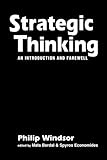Strategic Thinking : An Introduction and Farewell / Philip Windsor; ed. by Spyros Economides, Mats Berdal.
Material type: TextSeries: IISS Studies in International SecurityPublisher: Boulder : Lynne Rienner Publishers, [2023]Copyright date: ©2002Description: 1 online resource (199 p.)Content type:
TextSeries: IISS Studies in International SecurityPublisher: Boulder : Lynne Rienner Publishers, [2023]Copyright date: ©2002Description: 1 online resource (199 p.)Content type: - 9781588260482
- 9781685855123
- online - DeGruyter
| Item type | Current library | Call number | URL | Status | Notes | Barcode | |
|---|---|---|---|---|---|---|---|
 eBook
eBook
|
Biblioteca "Angelicum" Pont. Univ. S.Tommaso d'Aquino Nuvola online | online - DeGruyter (Browse shelf(Opens below)) | Online access | Not for loan (Accesso limitato) | Accesso per gli utenti autorizzati / Access for authorized users | (dgr)9781685855123 |
Frontmatter -- Contents -- Foreword -- Preface -- 1 The Autonomy of Strategy in the Nuclear Age -- 2 The Just War -- 3 The Legal Tradition -- 4 The Political Context of Strategy: Clausewitz -- 5 The Transformation of War -- 6 The Evolution of Strategic Thinking: Stage One -- 7 The Evolution of Strategic Thinking: Stage Two -- 8 The Evolution of Strategic Thinking: Stage Three -- 9 Patterns of Soviet Strategic Thought -- 10 Alliances -- 11 Arms Control -- 12 War All the Same -- 13 Guerrilla -- 14 The Rationality and Ethics of Nuclear Deterrence -- 15 Beyond the Cold War -- Bibliography -- Index -- About the Book
restricted access online access with authorization star
http://purl.org/coar/access_right/c_16ec
In this, his final book, Philip Windsor explores the emergence, meaning, and significance of the Cold War mentality. Tracing the evolution of strategic thinking from its origins in medieval Europe to the demise of the Cold War, he considers the peculiar character and autonomy that strategy acquired in the nuclear age. Windsor is concerned with changes in our understanding of war and strategy—changes, he argues, that resulted less from technological innovation per se than from the combined effects of technological, social, and political transformations. This process culminated in the nuclear age, when strategic thinking became "self-referring and self-legitimating" and strategic considerations emerged as "the decisive force in the conduct of the politics of states and blocs." Strategic Thinking addresses many of the themes that preoccupied Windsor throughout his academic career and on which his reflections threw such penetrating light: Soviet strategic thought, arms control, the role of alliances, the guerrilla phenomenon, and the rationality and ethics of nuclear deterrence. The final chapter explores the implications of the end of the Cold War for the future of strategic studies.
Mode of access: Internet via World Wide Web.
In English.
Description based on online resource; title from PDF title page (publisher's Web site, viewed 02. Mai 2023)


